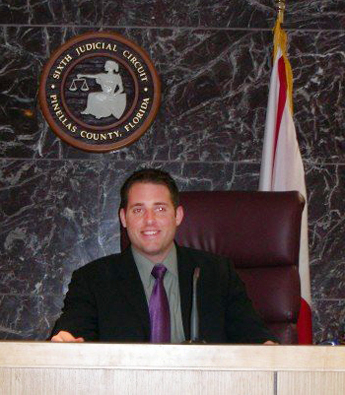
Iraq War veteran Scott Burton says he would never have ended up at Northwestern if it weren't for his four years as a U.S. Marine.
When he was a senior at Libertyville (Ill.) High School and deciding about his future, Burton was hesitant to start college. He went to see the school counselor, who told him that college was not for everyone.
"I think since then I've had a little something to prove," Burton says. "At Northwestern I have no doubts that I'm proving it."
Burton, who knew he was interested in public service, policy and politics. Burton enlisted in the U.S. Marine Corps and went to boot camp in Southern California.
"The military is such a big part of politics. I wanted to experience it for myself, firsthand," he says. "It's also known for providing discipline and dedication. I'm sure I needed some of that."
Burton spent seven months in Iraq and was part of the initial surge into Baghdad in March 2003. He was an infantry squad leader in charge of six to 10 Marines.
"We were the guys on the ground with rifles, locating the enemy, clearing buildings, interacting directly with the Iraqi people," he says.
Before his time in Iraq he spent six months throughout Asia, training with the militaries of U.S. allies. Upon his return home he enrolled at Loyola University Chicago. After his first year he transferred to Northwestern. He financed both institutions with the GI Bill.
"I just kind of dove in head first and ended up getting into Northwestern," Burton says. "Now I kind of attack everything that I do."
Burton served as captain of the Northwestern Mock Trial team, ran for Associated Student Government president and worked for John McCain's presidential campaign.
As a political science and history major, Burton says he is used to hearing opposing ideas about the war in Iraq from his fellow classmates, but he tries not to talk about his time in combat.
"I don't like to be defined by it, especially in a political science course," he says. "I wouldn't want my experiences to trump the discussion going on."
Burton says he's not sure about what's next, only that he hopes to get a job on Capitol Hill and attend law school in the near future.
The 26-year-old also hopes to embark on a side project — to record his memoirs from his military service and his return home.
"I hope to explain my experience readjusting to life outside the military," Burton says. "War changes the way a person thinks and acts, and it takes a while to reacclimate.When I left the military, it took me a while to be completely comfortable in my day-to-day activities. Despite being home, it's difficult to let your guard down when your life and the lives of your friends were constantly in danger for a long period of time."
Diagnoses of post-traumatic stress disorder are on the rise, and Burton says even veterans without PTSD have trouble readjusting. Meditation and yoga have helped him reacclimate to life at home.
"I advocate these activities to as many veterans as possible, whether or not they express difficulties in returning home," he says. "Examining yourself reduces the need to maintain constant awareness of your surroundings and aids in the ability to let go of what the military calls 'combat mindset,' the psychological state you reach when fighting."
He hopes his memoirs will help other veterans readjust to life at home.
— Christina Rosales (J11) |
